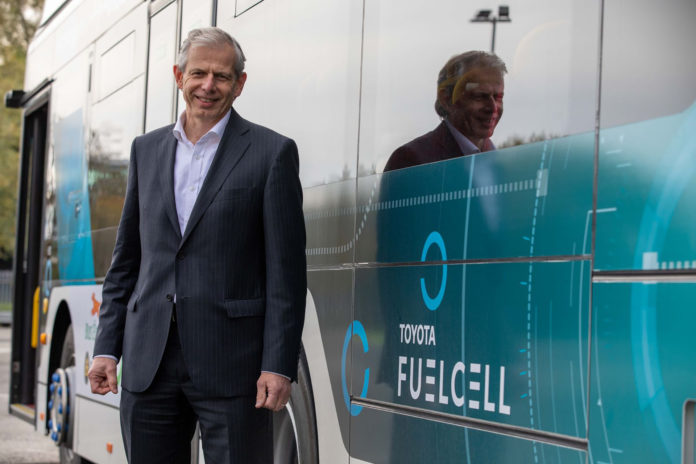
While Hydrogen Mobility Ireland (HMI) are currently running Ireland’s first Hydrogen Fuel Cell Bus trial in Dublin a global race to scale up green hydrogen has begun, with Europe pushing the hydrogen solution as key to the bloc’s future energy mix.
Paris and Berlin have announced multi-billion euro national strategies to move large sectors of their industries towards hydrogen power, which they both see as a crucial new energy source to meet their ambitious climate goals.
They have urged the European Commission to climb on board and are joining forces to create a Franco-German project to help supply hydrogen to themselves and their neighbours.
France’s 7 billion-euro plan to use clean hydrogen in industry and transport will cut the country’s carbon dioxide output significantly by 2030. The UK Government has also outlined its desire for hydrogen to have a key role in a “green Industrial revolution” in the last few days.
Hydrogen is the lightest, simplest and one of the most abundant chemicals on Earth and the most abundant in the Universe. It will never run out. It could provide a clean source of fuel and heat for homes transport and industry.
Hydrogen is already big business. The International Energy Agency (IEA) reported last year that “clean hydrogen is currently enjoying unprecedented political and business momentum, with the number of policies and project around the world expanding rapidly”.

The Hydrogen Council lobby group estimates that Hydrogen could meet 18% of the world’s energy demand by 2050.
Hydrogen Mobility Ireland (HMI), a partnership of businesses from across many sectors has launched a multi week, in-service, trial of a fuel cell electric bus in the Dublin area.
This bus, powered by a 60KW Toyota fuel cell stack, will be the first ever Hydrogen Fuel Cell Electric Vehicle (FCEV) put into public service operation on the Island of Ireland.
It is particularly significant that the vehicle in this first trial, in conjunction with the Department of Transport, is a Bus that will be operated on different routes by CIÉ Group bus companies Bus Éireann and Dublin Bus as well as by Dublin City University (DCU) and Dublin Airport over a number of weeks in November and December, albeit carrying limited passengers due to the current Covid restrictions.
This is a cutting-edge technology that promises to make a huge contribution to the Climate challenge in Ireland, specifically in the Transport Sector.
The zero emissions Caetano ‘H2.CityGold’ pre-production bus will run on green hydrogen (H2) produced in Dublin by BOC Gases Ireland Ltd using renewable electricity and water.
The fuel cell electric bus is refuelled in minutes, similar to a conventional bus and its electric motive power is obtained when the Hydrogen molecules from its fuel are combined with Oxygen molecules from the air in the Fuel Cell.

As part of HMI’s roadmap for hydrogen deployment, this collaborative trial will extend from early November to mid-December giving real in-use information on the practical operation of the technology in varying weather, usage, and traffic conditions.
HMI member ESB, will provide the green electricity used to produce the Hydrogen fuel for the trial. The only output from the vehicle is water.
The Hydrogen Mobility Ireland project is a partnership of businesses from across many sectors, together with public sector and academic stakeholders, with all-Island cooperation, joining together to deliver a coordinated approach to the introduction of this cutting-edge technology to ensure that Ireland can benefit from being an early starter in this environmental transport solution.
In addition to its use in transport, it is anticipated that Hydrogen will have a significant role to play in the decarbonisation of many other sectors of the economy.
The HMI Members, listed below, are working together to enable the delivery of Hydrogen production from green energy, a national network of H2 re-fuelling stations and a strong supply of vehicles of different types; from cars and vans to buses, trucks and even trains.
Of course, the completion of this will take a number of years but today’s innovation marks an important starting point on that journey.








